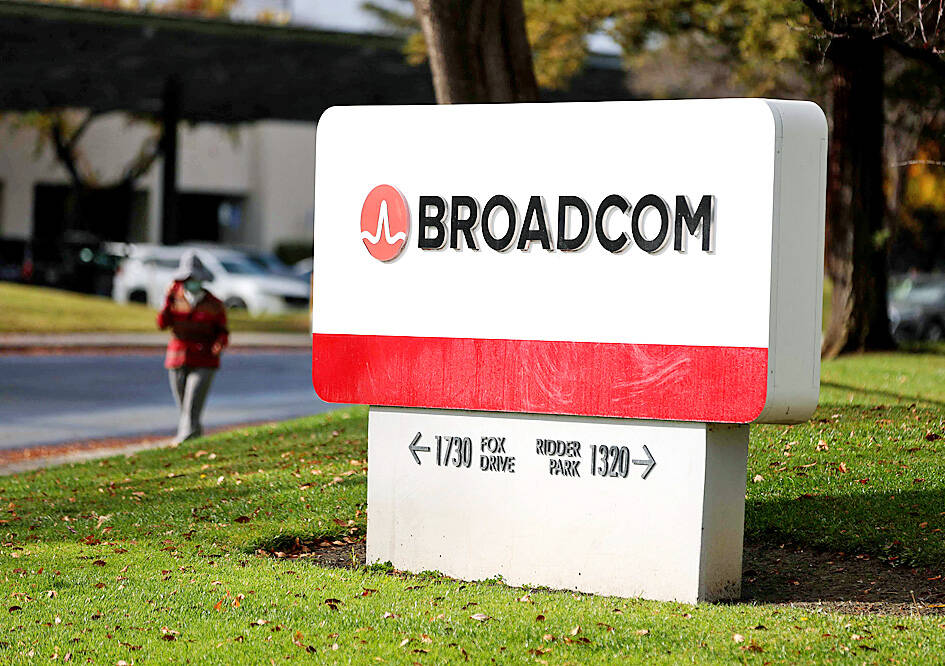Broadcom Inc has had informal talks with its advisers about making a bid for Intel Corp’s chip-design and marketing business, the Wall Street Journal reported, citing people familiar with the matter.
Nothing has been submitted to Intel and Broadcom could decide not to pursue a deal, according to the Journal.
Bloomberg News earlier reported that Taiwan Semiconductor Manufacturing Co (TSMC, 台積電) is in early talks for a controlling stake in Intel’s factories at the request of officials at US President Donald Trump’s administration, as the president looks to boost US manufacturing and maintain the country’s leadership in critical technologies.

Photo: AFP
Trump officials raised the idea of a deal between the two companies in recent meetings with the Taiwanese chipmaker, a person familiar with the matter said, and TSMC was receptive. It is unclear whether Intel is open to a transaction.
The talks are in early stages, and the exact structure of a potential partnership has not been established, but the intended result would have the world’s largest made-to-order chipmaker fully operating Intel’s US semiconductor factories, the person said.
It also would address concerns about Intel’s deteriorating financial state, which has forced the company to slash jobs and curb its global expansion plans.
The arrangement might involve having major US chip designers take equity stakes, along with support from the US government, the person said.
That means the venture would not solely be owned by a foreign company. TSMC is the go-to chipmaker for Apple Inc, Nvidia Corp and other companies developing semiconductors that power artificial intelligence algorithms.
Still, the possible partnership could run into political hurdles, not unlike those that have hamstrung a proposed acquisition of United States Steel Corp by Japanese maker Nippon Steel Corp.
A White House official said that the president is unlikely to support a foreign entity operating Intel’s factories.
The White House official said the Trump administration supports foreign companies investing and building in the US, but is “unlikely” to support a foreign firm operating Intel’s factories.
Broadcom and TSMC are not working together and all talks so far are preliminary and largely informal, the Journal reported.
Intel interim executive chairman Frank Yeary has been leading the discussions with possible suitors and Trump administration officials, who are concerned about the fate of a company seen as critical to national security, the report said.
Yeary has been telling individuals close to him that he is most focused on maximizing value for Intel shareholders, the report added.
Intel, Broadcom, TSMC and the White House did not immediately respond to requests for comment.
Additional reporting by Reuters

Taiwan Semiconductor Manufacturing Co (TSMC, 台積電) last week recorded an increase in the number of shareholders to the highest in almost eight months, despite its share price falling 3.38 percent from the previous week, Taiwan Stock Exchange data released on Saturday showed. As of Friday, TSMC had 1.88 million shareholders, the most since the week of April 25 and an increase of 31,870 from the previous week, the data showed. The number of shareholders jumped despite a drop of NT$50 (US$1.59), or 3.38 percent, in TSMC’s share price from a week earlier to NT$1,430, as investors took profits from their earlier gains

In a high-security Shenzhen laboratory, Chinese scientists have built what Washington has spent years trying to prevent: a prototype of a machine capable of producing the cutting-edge semiconductor chips that power artificial intelligence (AI), smartphones and weapons central to Western military dominance, Reuters has learned. Completed early this year and undergoing testing, the prototype fills nearly an entire factory floor. It was built by a team of former engineers from Dutch semiconductor giant ASML who reverse-engineered the company’s extreme ultraviolet lithography (EUV) machines, according to two people with knowledge of the project. EUV machines sit at the heart of a technological Cold

TAIWAN VALUE CHAIN: Foxtron is to fully own Luxgen following the transaction and it plans to launch a new electric model, the Foxtron Bria, in Taiwan next year Yulon Motor Co (裕隆汽車) yesterday said that its board of directors approved the disposal of its electric vehicle (EV) unit, Luxgen Motor Co (納智捷汽車), to Foxtron Vehicle Technologies Co (鴻華先進) for NT$787.6 million (US$24.98 million). Foxtron, a half-half joint venture between Yulon affiliate Hua-Chuang Automobile Information Technical Center Co (華創車電) and Hon Hai Precision Industry Co (鴻海精密), expects to wrap up the deal in the first quarter of next year. Foxtron would fully own Luxgen following the transaction, including five car distributing companies, outlets and all employees. The deal is subject to the approval of the Fair Trade Commission, Foxtron said. “Foxtron will be

INFLATION CONSIDERATION: The BOJ governor said that it would ‘keep making appropriate decisions’ and would adjust depending on the economy and prices The Bank of Japan (BOJ) yesterday raised its benchmark interest rate to the highest in 30 years and said more increases are in the pipeline if conditions allow, in a sign of growing conviction that it can attain the stable inflation target it has pursued for more than a decade. Bank of Japan Governor Kazuo Ueda’s policy board increased the rate by 0.2 percentage points to 0.75 percent, in a unanimous decision, the bank said in a statement. The central bank cited the rising likelihood of its economic outlook being realized. The rate change was expected by all 50 economists surveyed by Bloomberg. The